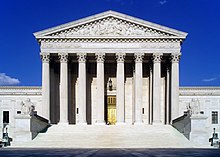ACLU commemorates anniversary of US Supreme Court decision on student free speech
Saturday, February 28, 2009
On Tuesday, the non-profit organization the American Civil Liberties Union (ACLU) released a video and press release commemorating 40 years since the landmark Supreme Court of the United States decision involving freedom of speech in the case Tinker v. Des Moines Independent Community School District. The Tinker case was decided on February 24, 1969. The case involved students in Iowa who chose to wear black armbands with peace symbols in protest of the Vietnam War – in violation of a recent school board policy. In their statement, the ACLU compared issues of freedom of speech in the Tinker case to a more recent case, Gillman v. Holmes County School District, where a school district in Florida forbade students from wearing rainbow symbols in school in support of LGBT rights.

Image: Wadester16.
In the Tinker case, John and Mary Beth Tinker and another student decided to wear black armbands with peace symbols to school in protest of the Vietnam War. The school district heard of the students' plans and decided to ban armbands in school. The three students case were represented by the ACLU of Iowa, and in a 7-2 decision the Supreme Court ruled for the plaintiffs.
| It can hardly be argued that either students or teachers shed their constitutional rights...at the schoolhouse gate. | ||
—United States Supreme Court Justice Abe Fortas | ||
Supreme Court Justice Abe Fortas wrote in the Opinion of the Court: "It can hardly be argued that either students or teachers shed their constitutional rights...at the schoolhouse gate."
The Gillman case began in September 2007 when according to students at Ponce de Leon High School in Florida, school officials responded improperly to complaints from a lesbian student that she was being harassed by other students. The ACLU contacted the school district on behalf of junior Heather Gillman, inquiring what form of symbols or slogans relating to LGBT rights would be allowed.
The school district responded saying it would not allow any expression of the sort, because it would "likely be disruptive", and said the wearing of these types of symbols by students could signify they were part of a "secret/illegal organization".
The video released by the ACLU includes clips of a deposition given by David Davis, the principal of Ponce de Leon High School in Florida. Davis testified he decided to ban students from wearing rainbow symbols in school because the rainbow is a symbol of "gay pride", and he said it "could hinder the educational process". He also testified that these symbols would immediately cause students viewing them to think of homosexual sex. Heather Gillman commented in the ACLU video "It was kind of scary, kinda, because I didn't know what people would think, but then I figured 'Who cares what people think, I'm standing up for something I believe in.'"
HAVE YOUR SAY
|
|
Have U.S. schools changed their approach to freedom of speech between Tinker (1969) and Gillman (2008)?
| |
On May 13, 2008, a federal judge decided in favor of the plaintiff, and permanently enjoined the school district from infringing upon the First Amendment rights of the students. Matt Coles, director of the ACLU's national LGBT Project, stated "Schools need to know censorship is illegal, and students need to know their schools can't get away with it."
| I’m grateful that the precedent established by the Supreme Court 40 years ago is still protecting students, including LGBT students and their friends. | ||
—Mary Beth Tinker | ||
In reflecting on the use of the Tinker precedent in the Gillman case, the ACLU cited three instances in which schools "were made to stop illegally censoring students thanks to Tinker v. Des Moines." These include a 2006 incident where a student in Ohio was instructed by school administrators to remove a t-shirt which read "I support gay marriage", and a 2007 incident where a teacher and an assistant principal at a school in Virginia told a student she could not wear a t-shirt with overlapping female gender symbols. In both cases the ACLU represented the students and school officials backed down and apologized for their actions.
In a blog post Tuesday by Mary Beth Tinker at Daily Kos, Tinker reflected on the similarities between her case before the Supreme Court of the United States and the more recent federal case of Heather Gillman. "I’m grateful that the precedent established by the Supreme Court 40 years ago is still protecting students, including LGBT students and their friends," wrote Tinker. She encouraged young people to speak out about issues of concern to them and to freely express their thoughts and views. Tinker is currently a nurse in Washington, D.C., and travels the United States speaking to students about their First Amendment rights.
Related news
- "ACLU describes President Bush's veto of CIA waterboarding ban as 'a callous disregard for human rights'" — Wikinews, March 11, 2008
- "Representative for ACLU tells Wikinews their opinion on lifting of Wikileaks court injunction" — Wikinews, March 3, 2008
- "Rights groups: Forcing Wikileaks.org offline raises 'serious First Amendment concerns'" — Wikinews, February 28, 2008
Sources
- Jen Russell. "ACLU: Schools Ignore Landmark Supreme Court Ruling, Still Censor Students’ Speech - LGBT youth frequently denied First Amendment Rights" — Youth Today, February 25, 2009
- "40 Years Later, Tinker Gives LGBT Students a Voice" — American Civil Liberties Union, February 24, 2009
- Mary Beth Tinker. "What a Black Armband Means, Forty Years Later" — American Civil Liberties Union, February 24, 2009
- "ACLU Marks Anniversary Of Landmark Student Free Speech Decision With New Video: 40 Years After Tinker v. Des Moines, School Officials Still Unconstitutionally Censoring Students" — American Civil Liberties Union, February 23, 2009
- "Gillman v. Holmes County School District - Case Profile" — American Civil Liberties Union, January 31, 2008

